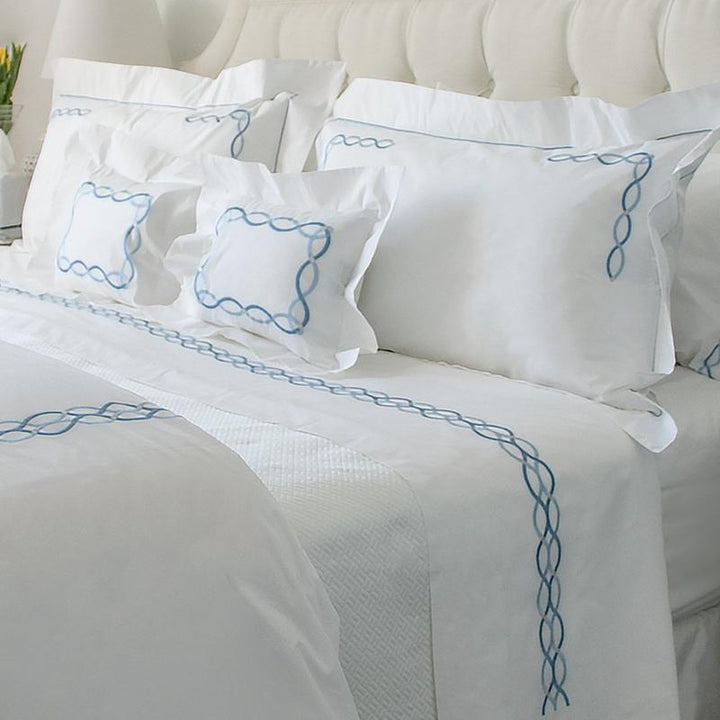When searching for new bedsheets, it can be important to know what your best options are. Most customers prefer bedding made from linen or cotton, as both materials have many advantages. In this article, let Pioneer Linens help you know what the difference between linen and cotton sheets is, as well as which one will be the correct choice for you. If you have any other questions, visit our store at 210 Clematis Street in West Palm Beach, call us at 800-207-5463, or email customerservice@pioneerlinens.com for more information.
What are Linen Sheets and How are They Made?
One thing that is important to note when we talk about linen sheets is that it’s important to know that we are referring to the material specifically. The term “bed linens” is often used interchangeably with “bed sheets,” so despite being in the name, not all bed linens are made from the material “linen.” Natural linen is made from cellulose fibers that originate within the flax plant. Getting linen from these plants can be very difficult, as it involves soaking the flax stalks to separate the fibers from their stem, then drying and separating the softer inner fibers from the outer layer fibers that aren't good enough to use. The usable fibers are then spun together into yarn, which is then made into the soft, durable, breathable fabric we know as linen!
Advantages to Linen Sheets
Moisture-Wicking: Linen is highly absorbent, AND it dries really quickly. This makes it perfect for hot sleepers, as it takes in sweat and then brings it to the surface, where the sweat can evaporate before it makes the material damp.
Durability: Thick fibers made from the flax plant are incredibly tough, able to maintain the appearance of the linen sheet after every wash.
Breathability: By using a low thread count, linen sheets have many microscopic openings to allow air flow, giving another reason it’s good for hot sleepers.
Environmentally Friendly: The method for making linen sheets makes very little waste, plus linen is completely biodegradable. Because of its durability, it’ll last you years before you ever need to replace it.
Disadvantages to Linen Sheets
Texture: Some people prefer bedding that feels butter soft, and linen sheets have a particular texture that feels coarse for some people.
Easily Wrinkles: Linen sheets are not very elastic, so they can lose their smoothness and wrinkle quite easily. Some customers enjoy the rustic appearance it gets over time, but in case you’re not one of them, ironing your linens after every washing can help prevent this.
Price: Linen can be a bit pricier than other materials, as it takes more work to produce. However, so long as it is properly cared for, linen can last you a very long time, meaning you won’t have to replace it any time soon.
How are Cotton Sheets Made?
Cotton sheets get their material from the white stringy fibers found within the seeds of a cotton plant. Once these fibers are cleaned and dried, they are then spun into yarn. Because of how versatile cotton is, it is available in multiple weave styles and thread counts while still being soft and breathable.
Different Types of Cotton Sheets
Brushed Cotton: Unlike regular cotton, Brushed Cotton uses a metal brush in order to give the fabric a fluffy and plush feeling. This practice makes the brushed side better able to trap heat while still allowing air circulation.
Egyptian Cotton: One of the highest quality types of cotton, Egyptian Cotton is grown in rich, fertile environments, the perfect environment for extra-long cotton fibers. Because of how difficult it is to make and obtain, it does tend to be more expensive than other types of cotton.
Pima Cotton: Sometimes referred to as Supima Cotton (a higher quality strand grown in the United States), Pima cotton is made from extra-long fibers grown in warm, dry climates. This gives it extra durability, softness, and breathability, without being as expensive as Egyptian cotton.
(Brume Cotton Sheet Collection)
Advantages of Cotton Sheets
Softness: Though it can vary for each type of cotton, it is often seen as the go-to for most customers as the softest type of bed sheet.
Breathable: Cotton is a very porous material, which means that air flows through it quite easily, making it a good choice for those who suffer night sweats.
Versatile in Weaves and Variations: As stated before, cotton can be used for many different weave styles, especially popular choices like sateen and percale. Cotton also comes in many different types, as shown before, with brushed, Egyptian, Pima, and many more. Whatever need you have, cotton is likely to be able to meet it.
Generally Inexpensive: Though not every type of cotton is cheap, most blends of cotton are made easily accessible to consumers. Whatever your price-range, you’ll generally find a type of cotton sheet to match what you are looking for.
Disadvantages of Cotton Sheets
Usually Retains Moisture: While cotton may be highly breathable, this doesn’t mean that it has the moisture-wicking properties of linen.
Creases Over Time: Like all types of bed sheet materials, cotton will eventually wrinkle and crease. You can iron it after each wash or every second wash in order to avoid this.
Shrinking: Cotton can shrink in the wash, especially if care instructions aren’t followed properly.
Pilling: Some types of cotton are made of short fibers, which can make them break over time. The term “pilling” refers to when those fibers split into a tiny ball. If this happens, you can at least remove it using a roller or fabric shaver.
Environmental Impact: In order to grow cotton, massive amounts of water must be used. Non-organic cotton uses a wide assortment of chemicals, such as pesticides.
Linens vs. Cotton: Which Should I Buy?
To give a better idea of which bed sheet material is right for you, let us compare the two and see which is better for important criteria.
Breathability: While both materials are breathable, linen tends to be much higher quality than cotton in this regard. Not only do linen sheets offer a lot more airflow, but they also have moisture-wicking properties, so if you’re willing to spend a bit more, you’ll generally find linen fits your needs better in this category.
Texture and Feel: Cotton sheets usually feel softer than linen sheets, even after they’ve been washed many times. This is because linen’s thick fibers, while still breathable, create a coarse feeling some people may not like, though it does begin to soften over time.
Durability: If you’re worried about how long your bedsheets will be usable for, linen sheets can last for years longer than cotton sheets. Though they also aren’t susceptible to pilling like cotton is.
Temperature: As stated before, linen is superior in terms of breathability, and with its moisture-wicking properties, it won’t retain moisture as much as cotton.
Maintenance: While both linen and cotton sheets are prone to wrinkling, linen tends to wrinkle a lot faster than cotton. Cotton tends to shrink in the wash, though you’ll need to be more careful with linen when drying, as too much heat can be more damaging to it. Overall, both have their own unique caveats to deal with, so it’ll be up to you to decide which is more preferable to maintain.
Cost: Though the price of cotton can vary depending on what type it is, cotton is typically seen as the low-cost option when compared to linen sheets.
Which Should I Choose Between Cotton or Linen Sheets?
While linen tends to have the advantage in most criteria, most people tend to prefer the cost efficiency and softness of cotton, especially when Pima cotton or Egyptian cotton is involved. Regardless of which you prefer, you’ll likely find both here at Pioneer Linens, and if you’re undecided, you’ll have our wonderful staff to help you decide which you’d prefer.
What to Expect from Pioneer Linens
At Pioneer Linens, our team is dedicated to providing you with the best service possible. That means helping you find the brands and styles you want for the product you are looking for. If you have any more questions or need consultation about any of the cotton or linen sheets, visit our store at 210 Clematis Street in West Palm Beach, call us at 800-207-5463, or email customerservice@pioneerlinens.com for more information.







